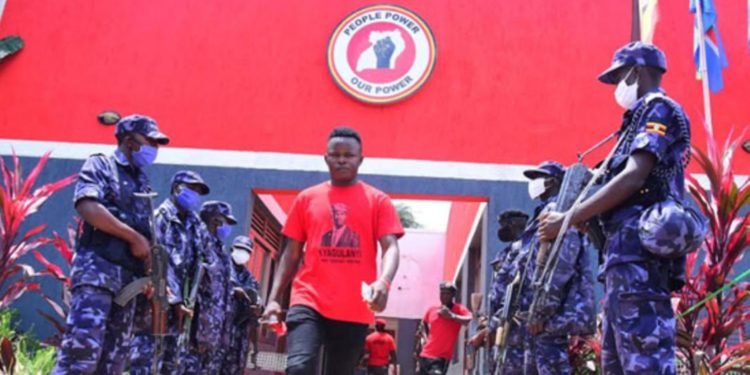The recent actions of the Uganda Police Force lay bare a nefarious plot to strangle political opposition and fortify an already despotic regime. Summoning the National Unity Platform (NUP) leadership to scrutinise its newly established leadership school under the flimsy guise of ensuring compliance is nothing but a vile abuse of power. It is a naked attempt to suffocate the NUP and obliterate any trace of political plurality in Uganda.
The police’s sudden, overzealous interest in the internal affairs of a legitimate political party is deeply troubling and reeks of malice. Why, one must ask, has the Uganda Police displayed no such concern for the training activities of the ruling National Resistance Movement (NRM) or other political entities? The NRM has long operated its so-called ideology clinics without interference. The Forum for Democratic Change (FDC) recently launched a leadership academy without a peep from the police. Yet, when the NUP opens a leadership school, the police descend like vultures on a carcass.
This hypocritical and partisan behaviour by the Uganda Police is a transparent act of political persecution. It is a blatant double standard that exposes the force’s allegiance not to the rule of law but to the despicable whims of President Yoweri Museveni and his corrupt cronies. The police, instead of upholding justice, have morphed into instruments of oppression, crushing dissent and shattering the dreams of millions who yearn for a fair and democratic Uganda.
The letter from SCP Moses Kafeero, demanding a meeting to interrogate the NUP’s school, is a chilling testament to the police state Uganda has become. The content of the letter is utterly laughable. It is not the business of the police to meddle in the lawful, internal activities of political parties. Such egregious overreach is indicative of a regime desperate to cling to power by any means necessary. The NUP’s training courses focus on the party’s values, principles, and goals, with no hint of subversive activity. Yet, the police’s insinuations suggest otherwise, laying the groundwork for future, more insidious crackdowns.
The NUP’s response rightly highlights the police’s grotesque duplicity. All political parties have conducted training for their leaders without interference. The NUP has been training its members since its inception, and the establishment of a centralised School of Leadership is a logical progression. Yet, the police, with their newfound zeal, are hell-bent on portraying this as a threat to national security. Such baseless, asinine allegations are not only ludicrous but dangerous, as they serve to justify future acts of brutal repression.
David Rubongoya, the NUP secretary-general, has poignantly articulated the absurdity of the police’s actions. His remarks underscore a broader, more alarming concern: the Uganda Police are grossly overstepping their mandate, transforming into a blunt instrument of political repression. Their involvement in regulating a political party’s leadership school is unprecedented and utterly unwarranted. It is a prelude to more draconian measures, designed to delegitimise and dismantle the opposition.
The timing of the police’s intervention is also deeply suspect. The NUP’s leadership school began orientation for its first cohort just days before the police’s heavy-handed summons. Participants include individuals from diverse backgrounds, reflecting the NUP’s unwavering commitment to inclusive leadership. The foundational modules of the school, which cover the philosophy of the NUP and the constitutional and political history of Uganda, are entirely above board. There is no justification for the police’s intrusive interest, other than to intimidate and disrupt.
This episode is emblematic of the broader, suffocating climate of fear and repression in Uganda. The police, once seen as guardians of public order, have become instruments of tyranny, wielding their power to crush political dissent. Their actions are not just an affront to the NUP but to all Ugandans who believe in democracy, human rights, and the rule of law. The police’s conduct is a stain on Uganda’s national conscience, a stark reminder of the depths to which the regime will sink to maintain its stranglehold on power.
The international community must not turn a blind eye to these despicable developments. Uganda’s inexorable slide towards authoritarianism cannot be ignored. The police’s harassment of the NUP is a glaring indication that the Museveni regime is unwilling to tolerate any form of opposition. It is imperative that democratic nations and human rights organisations condemn these actions unequivocally. Silence in the face of such blatant injustice is nothing short of complicity.
Ugandans, too, must resist this creeping tyranny with all their might. The police’s actions are a litmus test of the nation’s resolve to defend its democratic values. The NUP’s determination to continue its leadership training, despite police intimidation, is commendable. It is a beacon of hope in these dark, oppressive times, a testament to the resilience and courage of those who refuse to be cowed by state-sponsored thuggery.







Discussion about this post